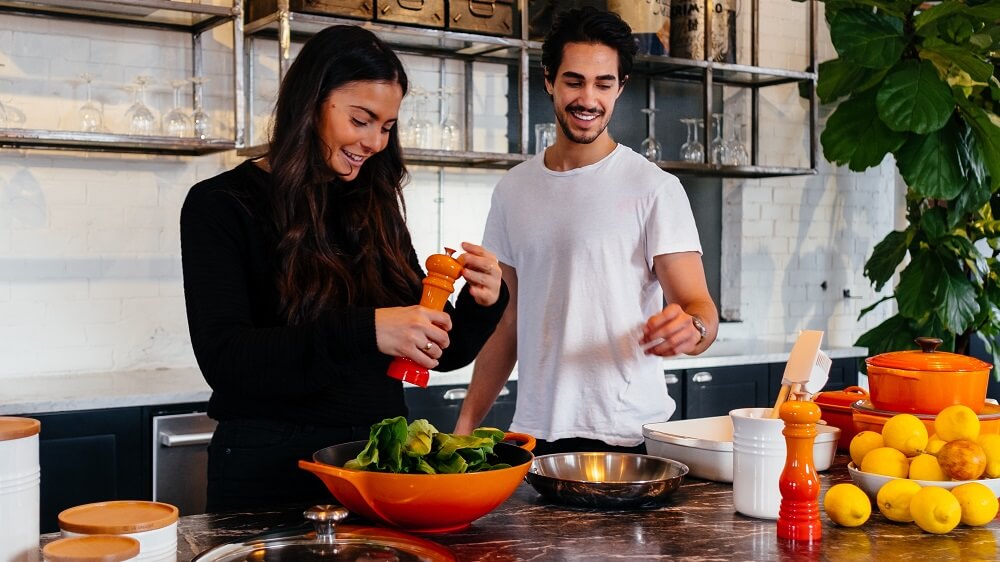You’ve made a decision for yourself: you’re going to try going vegan. It’s a big step for anyone who has grown up eating meat at every meal. But, armed with recipes, a grocery list, and a meal plan, you’re ready to cut animal products out of your diet. The only thing is, your partner isn’t on board.
It can be tricky when your partner doesn’t want to join you in trying out your new lifestyle. Relationships can have a big impact on your food choices, especially if you live together. Weekly shopping trips, dining out, and even what snacks to munch on while cuddling up on the couch for a movie may suddenly change. You might try to explain your reasoning for going vegan, whether that be for the animals, the environment, or your health, only to find yourself in a heated argument.
How to Go Vegan When Your Partner Eats Meat
So, what do you do? It’s ultimately up to you and your partner to decide. Solutions aren’t a one-size-fits-all, but here are some ways that you navigate food-related differences.

Set Boundaries and Respect Them
It’s understandable that anyone would love for their partner to join in on their new lifestyle. But if previous conversations turned into arguments, one thing you could do is to agree to boundaries and respect them. No matter how well you get along with your partner, at the end of the day, you’re each your own person. You may share similarities, but as with any relationship, you have your own likes, dislikes, fears, wants, needs, and goals.
When you’re with someone for a long time, sometimes it can feel like your personalities converge. You might share hobbies, fashion sense, and opinions on certain topics. But, boundaries — and respecting them are necessary (and healthy!) no matter how long you’ve been together. Sit down with your partner and have an open discussion, free from judgment. Talk about why your new lifestyle is important to you and leave space for your partner to say “no” to going vegan. Respecting your partner’s choice is just as necessary to maintaining boundaries as for them respecting yours.
Don’t compare your relationship to others where one partner is vegan and the other isn’t. Every relationship looks the same and everyone’s boundaries, especially when it comes to food, will look different. Do let your partner know what your boundaries are, but do not push your partner to change their habits if they have expressed that they’re not interested. Neither party should ever resort to guilt-tripping the other.

Seek Community
Sometimes, we might feel as if our partner should be there to meet every one of our needs. But one person can’t be our everything. Approach your new lifestyle the same way you would approach hobbies or interests. Chances are that you can each relate better to friends, not your partner, about certain things. You might love spending your evening playing board games while your partner prefers to try and hit a new personal record at the gym. The stakes can feel higher when you’ve gone vegan. It can be upsetting when your partner doesn’t share your compassion for animals, your concern for the environmental impacts of animal agriculture, or your health.
But, you can make it work. Use social media to find a local vegan community and commit to going to a meeting. Check Facebook.com, Meetup.com, and Instagram for groups and events in your area. Your city might also have a Reddit meetup group where you could meet other people for vegan food. It might take time to find your footing — not everyone in vegan circles gets along. Be patient with yourself as you carve your own path.

Find Vegan Food You Both Like
Last, but not least, find common ground. Sharing food with loved ones is important to a lot of people. Sit down together and look through vegan recipes that you’ll both like.
If you typically eat together, then plan out the weekly menu and ask what kind of food they’d want to eat. Show your partner that you going vegan doesn’t mean it’s going to be all avocado toast, salads, and grain bowls — you can make plant-based versions of just about everything. If your partner loves baked ziti, suggest cooking vegan baked ziti together. If they love steak, try your hands at making homemade seitan steak. Making vegan versions of your partner’s favorite dishes not only shows that you care about their likes and dislikes, but also that they won’t have to miss out on their favorite food just because you’re no longer eating the traditional version. Go food shopping together so meals aren’t just a one-person show.
Go on dinner dates to local vegan restaurants or pick a place where you both can each order something you like. Get your own snacks when you go to movies or share some vegan candy and popcorn. AMC and Cinemark theaters actually have vegan popcorn — just ask them to hold the butter.
These are all guidelines to navigating what could be a lifestyle conflict. Again, no two relationships will look the same. Some homes might agree to keep meat, dairy, and eggs out of the refrigerator while others might work on a compromise. Maybe your partner only eats animal products when going out for food. There are a lot of ways to go about it and every couple needs to find their way through open communication.
The most important thing is to not let a partner’s decision to not go vegan change anything about your conviction to your new lifestyle. No matter what, you should keep on doing you and let your partner do the same. Keeping an open mind with regards to food can help strengthen the relationship and teach you new things about each other. Just remember to approach food-related conversations without judgment and with respect to each other’s feelings



